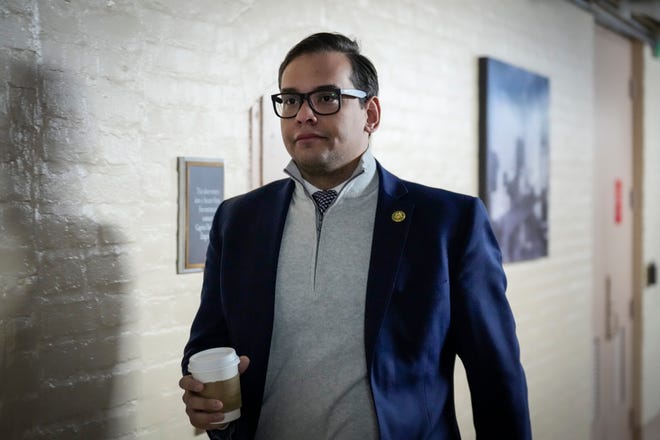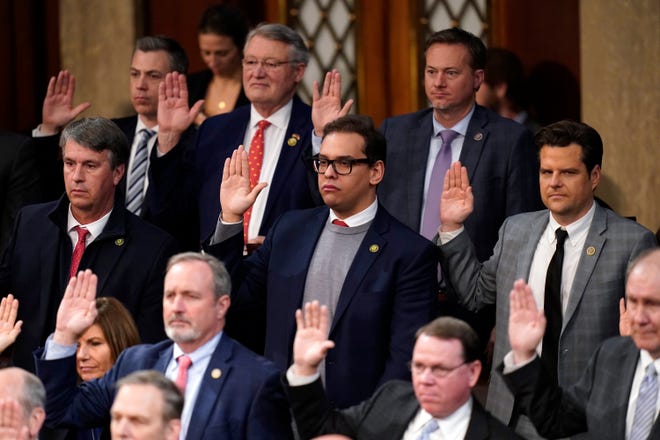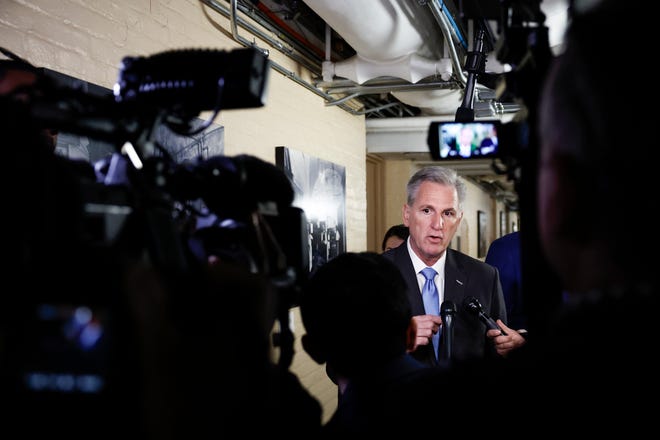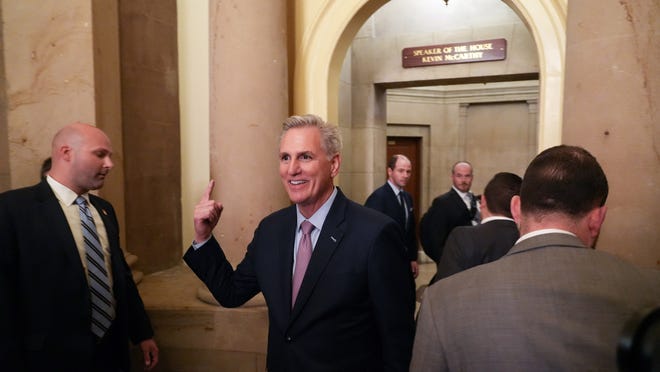
- Santos reported very little earnings and no assets in 2019 and 2020.
- By 2021, Santos was reporting a salary of $750,000 a year.
- Santos loaned more than $800,000 to his campaign and PACs.
How does a candidate for Congress loan more money to his campaign in a given year than he says he makes at a job or has in his bank account? And how does he suddenly start making a high six-figure salary a year later?
Those are questions that critics are now raising about Rep. George Santos, R-N.Y., who weeks ago admitted to fabricating major parts of his resume. The embattled congressman has since taken his oath of office and will be allowed to sit on congressional committees, a key job responsibility.
This week, a nonpartisan campaign finance watchdog filed a complaint with federal regulators alleging Santos had funneled money from unknown sources into his campaign in order to help get elected. The organization forwarded the complaint to the Department of Justice, which handles federal criminal matters.
On Tuesday, two Democrats filed a complaint with the House Ethics Committee raising questions about Santos’ financial disclosures, after he claimed almost no assets or income in 2020, but by the next year said he had a condo in Brazil and $750,000 in salary through his own company that was valued at up to $5 million.
Santos wrote on Twitter Wednesday, amid calls from some other House Republicans for his resignation: “I was elected to serve the people of #NY03 not the party & politicians, I remain committed to doing that and regret to hear that local officials refuse to work with my office to deliver results to keep our community safe and lower the cost of living. I will NOT resign!”
Thursday, House Speaker Kevin McCarthy, R-Calif., refused to bow to pressure to remove Santos and instead said he would let the Ethics Committee process play out.
An inquiry to the main contact for his campaign accounts was not immediately returned. USA TODAY also reached out to Santos’ office on Capitol Hill.
Here is a look at aspects of Santos’ finances and campaign finance reporting that have been raising questions.
‘Not mere fibs.’:NY Republicans call for George Santos to resign, McCarthy won’t remove him
What Congress can do:Rep.-elect George Santos lied ahead of winning his election.
Loaned $75,000 to his campaign but claimed he made no money
In his first disclosure to the House, filed in May 2020, Santos reported a commission bonus worth somewhere north of $5,000 from a New York company called LinkBridge Investors. The same day, he filed an amendment to the disclosure saying he made $55,000 from LinkBridge in 2019.
At the time, Santos was running an ultimately unsuccessful campaign for the Long Island congressional seat and loaning his campaign money, according to records from the Federal Election Commission. His campaign reported his occupation as self-employed on the FEC paperwork for all of these donations.
In late 2019, the year he claimed he did not have assets or income, he loaned the campaign $5,300. In the first three months of 2020, he loaned his campaign $74,750, despite claiming no income or assets that year. In June of that year, he loaned his campaign an additional $1,200.
“Mr. Santos’s financial disclosure reports for 2020 and 2022 are sparse and perplexing,” Reps. Ritchie Torres and Dan Goldman of New York wrote in their complaint to the House Ethics Committee. “At a minimum, it is apparent that he did not file timely disclosure reports for his most recent campaign.
“Moreover, his own public statements have contradicted some information included in the 2022 financial disclosure and confirmed that the 2022 financial disclosure failed to disclose other required information,” the complaint says.

Santos defiant:McCarthy declines to act amid GOP pressure
Reports: Federal prosecutors launching investigation into Rep.-elect George Santos’ finances
Reported huge increase in wealth through Devolder Organization LLC
In 2021, shortly after launching his second bid for Congress, Santos filed paperwork to create a new limited liability company in Florida, Devolder Organization LLC. (Devolder is his maternal surname.) He is the only member listed with the company, and it’s not clear from public filings what it does or who its clients are.
In his 2022 financial disclosure to the House, he wrote that the company does “capital intro consulting” and that he is the sole owner. Capital introduction is a type of matchmaking in the world of hedge funds between wealthy potential investors and the managers of such funds.
Santos reported the company brought in between $1 million and $5 million each year in 2021 and 2022, and that he made a salary of $750,000 in each of those years.
For the first time, he also reported assets: an apartment in Rio de Janiero, Brazil valued at up to $1 million; up to $250,000 in his checking account; and between $1 million and $5 million in his savings account.
“The scale of the sudden, overnight windfall that he had is really striking,” said Saurav Ghosh, the director of federal campaign finance reform at the nonpartisan watchdog Campaign Legal Center. His organization’s complaint notes Santos’ public statements where he gives confusing answers about what Devolder does.

Santos then donated more money to his campaign
Santos may have used his newfound wealth to loan additional money to his congressional campaign. During 2021 and 2022, Santos reported to the FEC that he loaned $705,000 to his campaign and $27,000 to GADS PAC. That would account for about a year’s salary.
GADS PAC is a leadership PAC Santos created in December 2020, about a month after he lost his first congressional race. The abbreviation is an apparent reference to his full initials for George Anthony Devolder Santos. Leadership PACs are often used to help a member of Congress gain influence with colleagues and donate to their campaigns. The committee made dozens of donations in 2021 and 2022, including $25,000 to the campaign of Rep. Lee Zeldin, R-N.Y., $10,800 to a committee tied to Rep. Elise Stefanik, R-N.Y., and $10,000 to a county Republican committee.
The Campaign Legal Center alleged in its complaint that Santos must have received money from someone else and then loaned the money to his campaign in an illegal straw donor scheme. Ghosh said the organization took the unusual step of forwarding it to the Department of Justice, which handles federal criminal investigations.
Ghosh said using straw donors to donate to a candidate is “one of the oldest tricks in the book,” but it’s more commonly coordinated among donors. For example, a donor might give a friend or relative money to make a donation, or will set up a limited liability company to funnel money through, he said.
“The most egregious straw donor scheme is one that actually involves the candidate itself,” Ghosh said.
Santos campaign spent money right below reporting thresholds
When the Santos campaign reported how it spent money during the recent election cycle, it reported dozens of expenses that were just below the FEC’s $200 threshold that requires a campaign to retain a receipt and other details of the spending.
Campaign Legal Center cited 37 items that were listed as costing $199.99, including for a room in an upscale hotel that advertises nightly rates over $700 and a parking facility where the organization said no combination of fees would add up to a number that ended in .99.
“His reporting isn’t just erroneous in kind of a commonplace way,” Ghosh said. “It actually looks like they’ve reported things falsely, which is very odd. You just don’t see campaigns do that. But again, everything about Santos’s campaign seems to be odd.”

Campaign finance regulators skeptical of large donations
The FEC is also raising questions about Santos’ fundraising from outside parties. In a Jan. 4 letter, the agency said one of Santos’ fundraising accounts took in too much money from some donors and did not report enough information about them.
The fundraising vehicle in question, Devolder Santos Nassau Victory Committee, reported raising $201,000 since it was registered in August, and splits money among Santos’ primary campaign account, a leadership PAC he sponsors and a county Republican committee. The FEC limits donations to such a committee to a $5,800 limit for his campaign account plus $5,000 for PACs.
The FEC cited donations from three people as potentially violating campaign finance law: A man who gave $26,000 but had no listed occupation or employer, and two men with the same address who gave $25,000 each and reported their occupations as “NYCBS/MD” and “NYCBS/Self Employed.”
Dan Weiner, the director of elections and government at New York University’s Brennan Center, said it’s common for people to give above the limit if they go to multiple events and aren’t tracking the checks they write, but this scenario is less common.
“Writing a $25,000 check in one sitting that is well above the limit that you can give to those three committees — that is a more unusual and frankly troubling scenario because that’s just well beyond the limits for those committees,” Weiner said.







